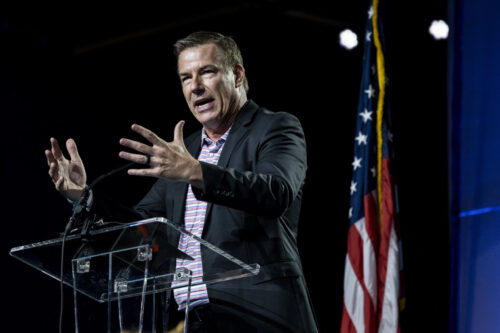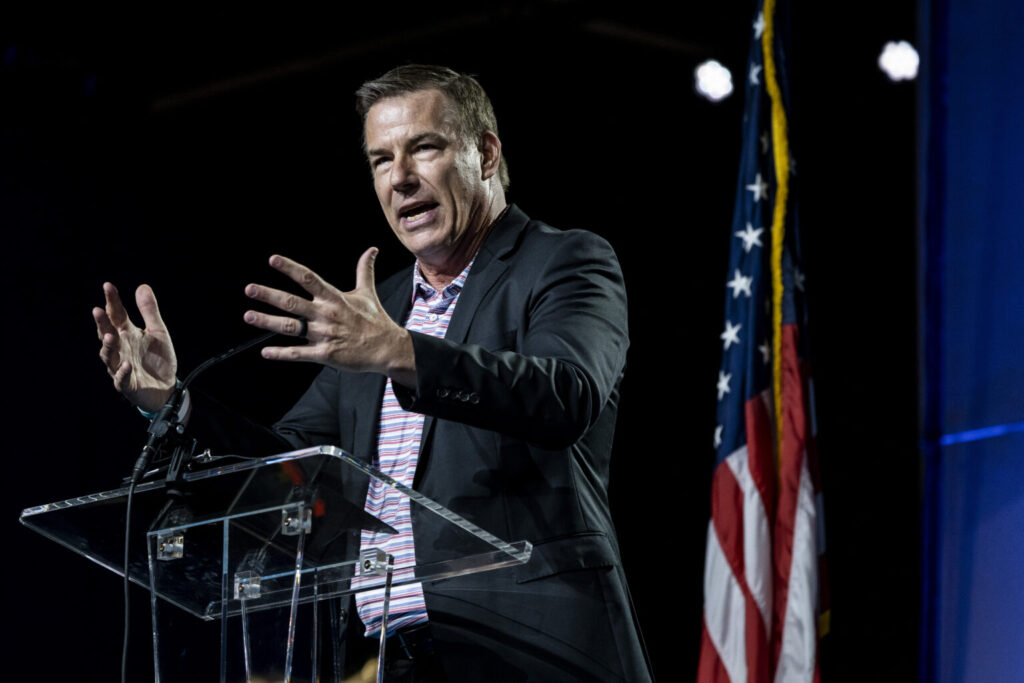(RNS) — A North Carolina pastor who championed sex abuse reform in the Southern Baptist Convention plans to run for president of the nation's largest Protestant denomination.
Bruce Frank, the longtime pastor of Asheville's Biltmore Church, announced Tuesday (April 2) that he will allow his name to be nominated for this summer's SBC annual meeting in Indianapolis.

Bruce Frank speaks about the work of the Sexual Abuse Task Force at the Southern Baptist Convention Annual Meeting in Anaheim, California, June 14, 2022. (RNS Photo/Justin L. Stewart)
When Frank announced his candidacy, he said, “As the greatest missionary force in modern history, I believe that the best days of the SBC are ahead of us,'' and that as president he would focus on evangelism, abuse reform, and revitalization of the church. Stated. .
Mr. Frank joins a crowded race for the presidency, a volunteer role that oversees the denomination's annual meeting and influences nominations to key SBC committees.
The SBC presidency is also a bully pulpit, with the president becoming the public face of the 13 million-member denomination during his term. Most SBC presidents serve two consecutive one-year terms, including current president Bart Barber, a Texas pastor.
Frank is a candidate along with fellow North Carolina pastor Clint Presley, Oklahoma pastor Mike Keyborn, Tennessee pastor Jared Moore, and seminary professor David Allen.
The remaining four candidates recently participated in an online forum, where much of the conversation revolved around the denomination's finances, abuse reform, and an amendment that would bar churches in which women hold the title of pastor from the SBC.
The next SBC president could play a role in the future of abuse reform in the denomination. These reforms are currently being overseen by a Volunteer Implementation Task Force appointed by Barber, whose future will likely be determined by Barber's successor.
While more churches have recognized the need to take abuse seriously and some progress has been made at the state and local level, reform at the national level has stalled. There are no long-term plans to fund the reforms, and there is little support so far for a new nonprofit known as the Abuse Response Committee. Organizers say the committee was recently established to provide long-term oversight of the reforms.
The Implementation Task Force is scheduled to unveil a new curriculum to help churches respond to abuse at the SBC annual meeting and will host a meeting with state leaders later this month.
Although candidates in recent presidential debates said abuse is a serious problem for the SBC, Moore and Allen said the abuse is not a crisis or systemic within the denomination. Mr Keyborn, who sits on the Abuse Task Force, said it was a crisis.
Pressley said abuse is a crisis, but the response to the crisis has caused some “fog” and confusion.
“As the fog lifts a little bit, we're starting to see that this is not a system-wide crisis,” he said, according to Baptist Press, the SBC's official publication. “This is a crisis, but it's not showing up in every church. But every church needs to be prepared. Every church needs to respond.”
During the forum, Mr. Moore expressed skepticism about the proposed SBC abuser “Ministry Check” database approved by messengers to the SBC annual meeting. A website for the database was launched last year, but no names are listed on the site.
Moore said the database doesn't work.
“As a local Southern Baptist pastor, this sounds like the SBC's version of the FBI,” he said, according to Baptist Press. “It's so unrealistic and unattainable to think that potential abuse allegations can be investigated. I admire their enthusiasm, but I think they're wrong.”
In an interview earlier this year, Keyborn defended the task force's ongoing efforts and the SBC's progress on abuse reform, saying there is more work to be done. He also said he ran for president because of his deep love for his denomination, saying his local church in Oklahoma changed his life.
Keyborn said he comes from a family with issues that have little to do with the church. A volunteer from a local church then invited him to a vacation Bible school, and he said he found love and acceptance at the church.
“They just loved me,” he said. “What we've always focused on as a conference has been the gospel. And when we center on the gospel, it settles everything else down.”
Frank said if elected president, he would continue to support abuse reforms passed by local church representatives known as the Messengers. He said there were loud voices on social media trying to downplay the scope of the reforms.
“I think what we've seen several times is that the loudness of the voice on Twitter doesn't necessarily match the beliefs of the messenger,” he said. He said he will also focus on revitalizing older churches, which he sees as tied to the SBC's broader evangelistic mission. Like many denominations, the SBC has seen a decline in membership in recent years, from 16.3 million members in 2006 to just over 13 million today. Many of those churches, like churches across the country, are in decline and face an uncertain future.
“Mathematics shows that if we don't change our trajectory, churches will close,” he said, adding that he believes many churches can get back on their feet.
SBC presidential races have been contentious in recent years, with candidates backed by a group known as the Conservative Baptist Network arguing that the denomination has become too liberal, and candidates backed by a group known as the Conservative Baptist Network, who say the denomination has become too liberal, and a candidate backed by a group known as the Conservative Baptist Network, which argues that the SBC has challenges but remains conservative. We are facing people who think that
That sparked a heated debate on social media, highlighting differences between the candidates. So far this year's race has had a friendlier atmosphere.
Frank said it remains to be seen whether that trend will continue.
“It's going to be an interesting few months,” he said.

